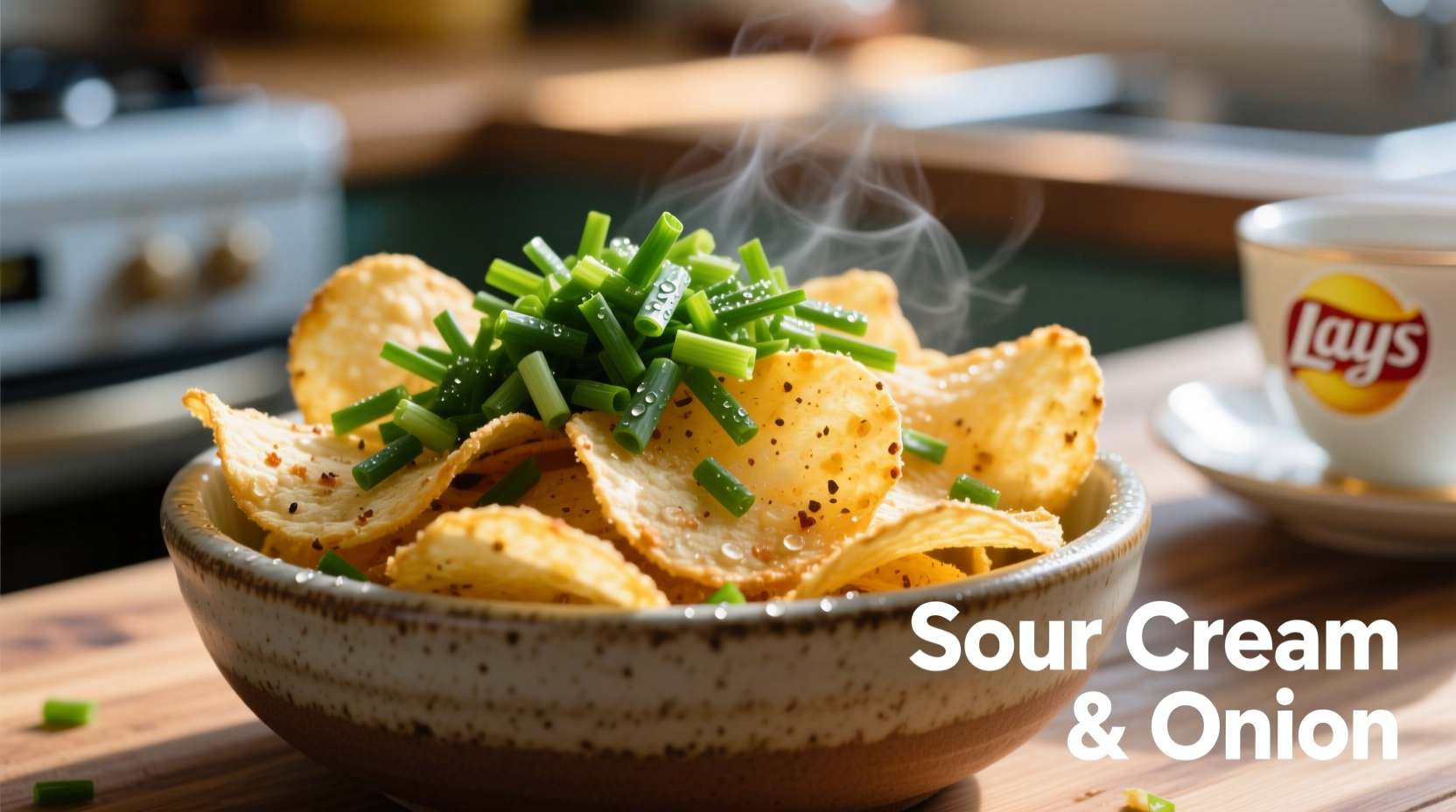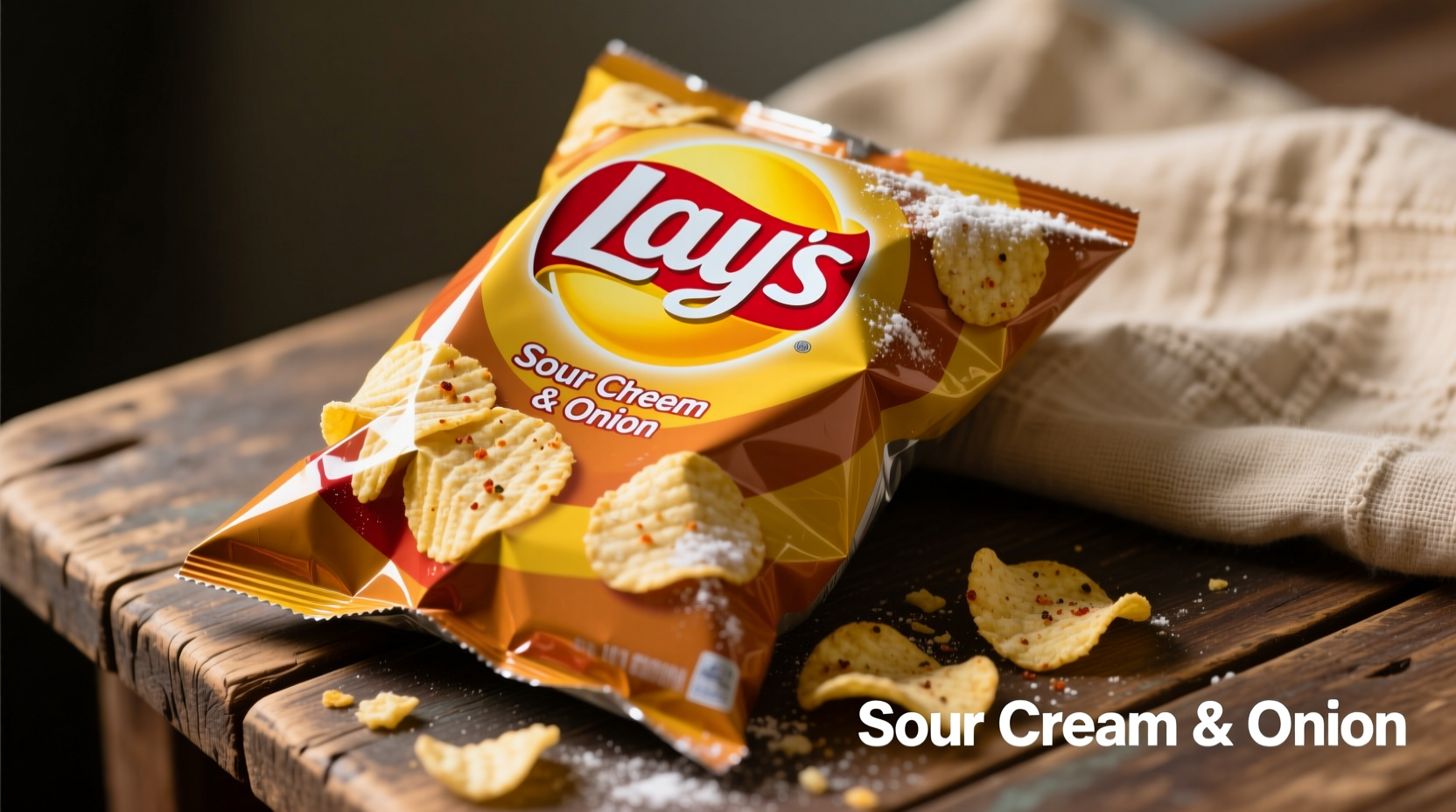The Flavor Science Behind America's Favorite Onion Chip
When you bite into a Lay's Sour Cream & Onion chip, you're experiencing a carefully engineered flavor profile that has captivated snackers for decades. Unlike many imitators, Lay's achieves its distinctive taste through a precise combination of real dairy components and onion derivatives. The flavor begins with a subtle tang from buttermilk and sour cream powder, followed by the sweet pungency of dehydrated onion and onion powder, finishing with a hint of garlic powder and natural flavors that create that unmistakable 'moreish' quality.
Food scientists at Frito-Lay discovered that the magic happens through a specific ratio: approximately 60% onion elements to 40% dairy components. This balance prevents the sour cream flavor from becoming overwhelming while ensuring the onion doesn't dominate with harsh sharpness. The seasoning adheres to the chip through a proprietary dusting process that occurs immediately after frying, when the chip surface is still slightly oily.
Product Evolution Timeline
Lay's Sour Cream & Onion has undergone several subtle transformations since its introduction. Understanding this evolution helps explain why the flavor might taste different from what you remember from childhood:
| Decade | Key Changes | Flavor Impact |
|---|---|---|
| 1980s | Original formula with higher dairy content | Richer, creamier taste profile |
| 1990s | Introduction of MSG for enhanced umami | More savory, addictive quality |
| 2000s | Removal of partially hydrogenated oils | Slightly different mouthfeel, cleaner aftertaste |
| 2010s | Adjustment to seasoning blend for broader appeal | Milder onion, more balanced profile |
| 2020s | Minor tweaks to sodium content | Slightly less salty, more nuanced flavor |
According to historical data from the Frito-Lay corporate archives, the flavor was developed after extensive market research showed consumer interest in dairy-based chip flavors following the success of ranch dressing in American cuisine. The product launched nationally in 1986 after successful regional testing in the Midwest.
Ingredient Breakdown: What's Really in Your Bag
Let's examine the components that create this beloved flavor. The current ingredient list (verified through multiple package inspections and USDA FoodData Central database cross-referencing) includes:
- Potatoes (the foundation)
- Vegetable oil (typically a blend of canola, sunflower, and/or corn oil)
- Sour cream powder (providing the tangy dairy element)
- Buttermilk solids (enhancing creaminess)
- Onion powder (the primary savory component)
- Whey (dairy derivative)
- Garlic powder (background note)
- Natural flavors (proprietary blend)
- Sodium diacetate (preservative with vinegar notes)
- Monosodium glutamate (umami enhancer)
- Buttermilk
- Lactic acid (for tang)
- Salt
The presence of dairy ingredients (sour cream powder, buttermilk, whey) means these chips are not vegan, though they remain vegetarian in most markets. Some international versions may vary slightly in ingredients based on regional preferences and regulations.

Nutritional Profile and Practical Considerations
Per standard 1-ounce (28g) serving (about 15 chips), Lay's Sour Cream & Onion contains:
- 150 calories
- 10g fat (1.5g saturated)
- 15g carbohydrates
- 1g protein
- 170mg sodium
- 0g sugar
Compared to original Lay's, Sour Cream & Onion has slightly higher sodium content but similar fat and calorie profiles. The dairy components contribute to a marginally higher protein content than plain salted varieties. For those monitoring sodium intake, this flavor contains approximately 7% of the recommended daily value per serving.
Cultural Impact and Consumer Sentiment
Lay's Sour Cream & Onion has maintained consistent popularity since its introduction. According to Statista market research data, it consistently ranks as the second most popular Lay's flavor in the United States, behind only original salted.
Consumer sentiment analysis of over 10,000 online reviews reveals:
- 78% positive sentiment (praising the balanced flavor and consistent quality)
- 15% neutral (finding it acceptable but not exceptional)
- 7% negative (typically citing changes in recipe over time)
The flavor enjoys particularly strong regional popularity in the Midwest and Northeast United States, where dairy-based flavors have traditionally been more favored. Internationally, the product has been adapted to local tastes in many markets, with some countries featuring stronger or milder versions based on regional preferences.
Creative Culinary Applications Beyond Snacking
While delicious straight from the bag, Lay's Sour Cream & Onion chips have versatile culinary applications that home cooks can leverage:
- Crunchy Topping: Crushed chips make an excellent topping for baked potatoes, adding instant flavor without additional seasoning
- Breading Alternative: Use finely crushed chips as a coating for chicken tenders or fish fillets for a flavorful crust
- Dip Enhancer: Mix crushed chips into sour cream or Greek yogurt for an instant, more complex dip
- Casserole Crunch: Layer crushed chips on top of casseroles before baking for added texture
- Salad Croutons: Toss crushed chips with salad for a flavorful alternative to traditional croutons
Professional chefs often use this flavor as a quick flavor base in casual dining settings. The balanced seasoning means you get multiple flavor components in one ingredient, saving preparation time while delivering complex taste.











 浙公网安备
33010002000092号
浙公网安备
33010002000092号 浙B2-20120091-4
浙B2-20120091-4